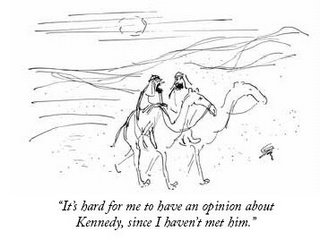For instance, Sunil Gavaskar is someone who comes to our drawing room every day of the cricket match. Talking intimately. Gossiping. Therefore, we have an opinion on everything Gavaskar does or has done in the past, not just related to cricket.
Uninformed opinion is perhaps the most important characteristics of our age.
 Artist: Everett Opie published The New Yorker Jan 30 1960
Artist: Everett Opie published The New Yorker Jan 30 1960p.s After I wrote above, I came across following in FOUAD AJAMI's review of Pervez Musharraf's books "IN THE LINE OF FIRE, A Memoir" (NYT Jan 7 2007).
"We may not know Bahrain but we can be friends with its king; we may not have known Persian ways, nothing, for instance, of the seminarian culture of Qum, but we knew Shah Mohammed Reza Pahlavi, and our travelers and diplomats and journalists felt at home in his court. Jordan may be a realm apart, a place of poverty and a breeding ground of angry warriors of the faith, but young King Abdullah II and his queen, Rania, are fixtures on the international circuit. And now that we have extravaganzas like Davos, no land is truly foreign, the exotic rulers can rub shoulders with Oliver Stone and Angelina Jolie. They can all serve on panels together. Why bother learning Arabic, Farsi or Urdu, when the rulers of distant lands offer a shortcut for the voyeurs and the travelers. "
Therefore, if Opie were to draw this picture from Kennedy's viewpoint, it might read: "It is hard for me to have an opinion about Sheikh or his camel since I haven't met them or been to his land or studied anything about his culture........hey but hold on, I am meeting him at Davos next month and then maybe I will know enough about all this to invade and occupy his land"
